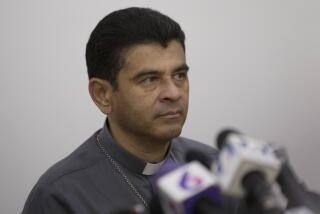Sandinista Mobs Harass Protestants : Nicaragua Church-State Tensions Grow
MANAGUA, Nicaragua — New tensions are developing between the leftist Sandinista government and some Protestant churches here, after three years of calm.
Three Protestant ministers are in the custody of state security agents for undisclosed reasons, and at least 11 others have been detained two to three days and questioned in the past three weeks.
The tension began Sept. 29 when evangelicals here celebrated World Bible Day in a small stadium after obtaining the required permission from local police.
Pro-Sandinista groups known as turbas , or mobs, attempted to break up the meeting. There were several injuries in the fighting that followed.
The turbas are generally made up of zealous Sandinista youths who stage demonstrations against government critics. They have turned out principally against political opposition groups and Roman Catholic rallies.
Protestants make up about 10% of the population in predominantly Roman Catholic Nicaragua. In the first two years after the Sandinistas came to power in July, 1979, several Protestant churches were assaulted by the turbas, who took over the buildings and charged that their pastors were trying to spread religious fanaticism.
Among the groups that were attacked in 1979 were the Jehovah’s Witnesses, the Seventh-day Adventists and some Pentecostals sects. Some held clandestine services so as not to attract attention.
The tension eased by 1982, and churches were returned to their religious leaders, who again held services in them.
Criticism of evangelical or Protestant groups has increased in government news and broadcast media, joining the long-running complaints against the Roman Catholic hierarchy.
A Pentecostal pastor, who asked not to be identified for fear of reprisal, said the Protestant churches in Nicaragua have split into pro-Sandinista and independent groups. He said the split is most noticeable among Baptist churches.
“The group of Baptist pastors that supports the Sandinistas directs the Committee for Aid for Development, and we belong to the National Council of Evangelical Pastors of Nicaragua,” the pastor said. The first includes only Baptists, while Baptists and other groups form the second committee.
“We think that certain sectors of the government would like the independent pastors to show political support for the government, but we believe that politics is not part of our earthly life,” he said.
The pastor said he had been detained for two days and kept naked in a small, dark and cold cell. He said he was questioned about political activities.
Boanerges Mendoza, a Baptist who leads First Central American Church, remains in custody of state security agents. Eleven other council members were detained during the past three weeks and released, the Pentecostal pastor said.
The government declared a national state of emergency Oct. 15, purportedly to combat internal subversion and because of attacks by U.S.-supported rebels.
More to Read
Sign up for Essential California
The most important California stories and recommendations in your inbox every morning.
You may occasionally receive promotional content from the Los Angeles Times.










